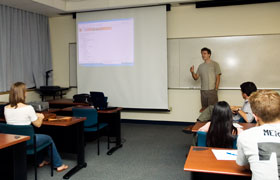  |
| HOME | THIS ISSUE | CALENDAR | GRANTS | BACK ISSUES | < BACK | NEXT > |
FYE class on Nobel Prizes a window into intellectual achievementby Karen A. Grava - October 11, 2005 |
||||
|
Gerald Dunne and George Gibson are used to having hunches. As physicists, they have to hypothesize, speculate, and conjecture every day. And many times, it takes years to prove or disprove their theories. This fall, however, they are finding out mid-way through the semester whether their predictions were right. The two physics professors – together with colleagues in other disciplines – are leading a group of first-year students through a look at this year’s recipients of the Nobel prizes, the prizes named for Alfred Nobel and awarded each year in physics, chemistry, economics, physiology or medicine, literature, and peace. “For the first half of the semester, we have been looking at who might win, and for the second half we will look at who did win,” Dunne says. The idea for the new First Year Experience course came last October when Dunne gave a lecture about last year’s winners in physics, David Gross, David Politzer, and Frank Wilczek, theoretical physicists who won for the discovery of “asymptotic freedom”, a fundamental property of the forces acting between particles at the fantastically small sub-nuclear scales. Dunne’s talk was mobbed by UConn students, students from E.O. Smith High School, and professors from several disciplines. This led to a discussion with Gibson about the popularity of the Nobel prizes, and the idea for the course was born. “The Nobel is the ideal that’s out there for people in many fields,” Dunne says. “It is a genuine measure of achievement and there is a real aura about it. The idea of the course is to expose the freshmen to a broad range of exceptional intellectual achievement across many disciplines, using the Nobel prizes as the attraction.” Both professors have met many of the recent Nobel laureates, who often give talks at conferences. And, ever since the Katzenstein Distinguished Lecture, named in honor of UConn alumnus Henry Katzenstein, was begun nine years ago by the physics department, a Nobel laureate has delivered the lecture. One of Katzenstein’s UConn classmates, David Lee, MS, ’55, went on to win the 1996 Nobel Prize for Physics, and delivered the first Katzenstein lecture. The talks, the physicists say, have been well attended by students, who are fascinated with the prize and its winners. This year’s Katzenstein lecture on Sept. 16 was given by Nobelist Frank Wilczek. Another Nobel winner, Richard Smalley, who won the chemistry prize in 1996, was informed that he had won the prize while in the midst of an informal research discussion the morning of a scheduled physics colloquium at UConn. “He was called away by the secretary, and when he came back, he looked like he had seen a ghost,” Dunne recalls. He immediately continued the discussion and proceeded with the day’s activities. “There is always a story behind the story,” says Gibson. “This inspired us to use the Nobel prizes as a window into the intellectual richness of various different disciplines.”
Most Nobel laureates, adds Dunne, are entertaining, experienced speakers who are brilliant and good at communicating. Many also have a wonderful sense of humor. “The Nobel laureates are interesting to students in any field. They may have done work on a narrow area, but they offer breadth, depth, and excitement.” Some of them did the work that earned them their Nobel when they were not much older than the freshmen and sophomores who will be taking the class this fall. “In physics, last year’s Nobel laureates included two scientists who did the work when they were graduate students about 21 years old,” says Dunne. “We looked at what they did to win the prizes, and also what they did after they won the prize.” The course relies on guest professors from each of the disciplines in which a Nobel prize is awarded. Dunne and Gibson asked them to take chances and make predictions about winners. Some of the Nobel candidates are identified by a “network of spies” in their fields, who submit their names as worthy candidates. Others have already won other prestigious prizes, such as the Booker Prize (for literature) or the Wolf Prize (awarded annually in agriculture, chemistry, mathematics, medicine, physics, and the arts). Speakers for the course have been Professors Gibson for physics; Joseph Loturco for physiology or medicine; Fotis Papadimitrakopoulos for chemistry; Roger Wilkenfeld for literature; and Christian Zimmerman for economics. The predictions of the first three have already been put to the test with recent prize announcements. Not a single winner was predicted, even those these, says Dunne, “are the easy ones. Peace and literature are even harder.” “But this was not the point of the course,” says Gibson. “Our goal is to have the students so interested in the topic that they read the books that have won the literature prize, seek out opportunities to read the work of the economists, chemists, physicists, biologists, physicians, and others who have won, and tune into the good works of the peace prize winners. “We want them motivated to find out just who these people are and what they have accomplished.” |
| ADVANCE HOME UCONN HOME |

